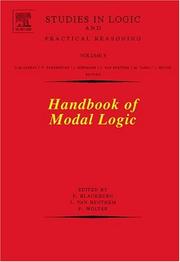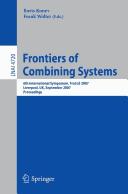| Listing 1 - 5 of 5 |
Sort by
|
Digital
ISBN: 9783540746218 Year: 2007 Publisher: Berlin, Heidelberg Springer-Verlag Berlin Heidelberg
Abstract | Keywords | Export | Availability | Bookmark
 Loading...
Loading...Choose an application
- Reference Manager
- EndNote
- RefWorks (Direct export to RefWorks)
Mathematical logic --- Programming --- Artificial intelligence. Robotics. Simulation. Graphics --- Computer. Automation --- programmeren (informatica) --- wiskunde --- software engineering --- KI (kunstmatige intelligentie) --- logica --- robots --- AI (artificiële intelligentie)

ISBN: 9780444516909 0444516905 9780080466668 0080466664 1280729163 9786610729166 Year: 2007 Volume: 3 Publisher: Amsterdam Boston : Elsevier,
Abstract | Keywords | Export | Availability | Bookmark
 Loading...
Loading...Choose an application
- Reference Manager
- EndNote
- RefWorks (Direct export to RefWorks)
The Handbook of Modal Logic contains 20 articles, which collectively introduce contemporary modal logic, survey current research, and indicate the way in which the field is developing. The articles survey the field from a wide variety of perspectives: the underling theory is explored in depth, modern computational approaches are treated, and six major applications areas of modal logic (in Mathematics, Computer Science, Artificial Intelligence, Linguistics, Game Theory, and Philosophy) are surveyed. The book contains both well-written expository articles, suitable for beginners approaching the
Mathematical logic --- Modality (Logic) --- Modalité (logique) --- Logic --- Logique --- Handbooks, manuals, etc. --- Guides, manuels, etc --- ELSEVIER-B EPUB-LIV-FT --- Logic. --- Argumentation --- Deduction (Logic) --- Deductive logic --- Dialectic (Logic) --- Logic, Deductive --- Intellect --- Philosophy --- Psychology --- Science --- Reasoning --- Thought and thinking --- Modal logic --- Nonclassical mathematical logic --- Bisimulation --- Methodology --- Modalité (logique)

ISBN: 9783540746201 354074620X 3540746218 Year: 2007 Publisher: Berlin, Germany ; New York, United States : Springer,
Abstract | Keywords | Export | Availability | Bookmark
 Loading...
Loading...Choose an application
- Reference Manager
- EndNote
- RefWorks (Direct export to RefWorks)
Logic, Symbolic and mathematical --- Computer science --- Logique symbolique et mathématique --- Informatique --- Congresses. --- Congrès --- Computer Science --- Mechanical Engineering - General --- Mathematical Theory --- Mechanical Engineering --- Engineering & Applied Sciences --- Mathematics --- Physical Sciences & Mathematics --- Information Technology --- Artificial Intelligence --- Computer science. --- Computer programming. --- Software engineering. --- Computers. --- Mathematical logic. --- Artificial intelligence. --- Computer Science. --- Theory of Computation. --- Artificial Intelligence (incl. Robotics). --- Mathematical Logic and Formal Languages. --- Programming Techniques. --- Software Engineering. --- AI (Artificial intelligence) --- Artificial thinking --- Electronic brains --- Intellectronics --- Intelligence, Artificial --- Intelligent machines --- Machine intelligence --- Thinking, Artificial --- Bionics --- Cognitive science --- Digital computer simulation --- Electronic data processing --- Logic machines --- Machine theory --- Self-organizing systems --- Simulation methods --- Fifth generation computers --- Neural computers --- Algebra of logic --- Logic, Universal --- Mathematical logic --- Symbolic and mathematical logic --- Symbolic logic --- Algebra, Abstract --- Metamathematics --- Set theory --- Syllogism --- Automatic computers --- Automatic data processors --- Computer hardware --- Computing machines (Computers) --- Electronic calculating-machines --- Electronic computers --- Hardware, Computer --- Computer systems --- Cybernetics --- Calculators --- Cyberspace --- Computer software engineering --- Engineering --- Computers --- Electronic computer programming --- Electronic digital computers --- Programming (Electronic computers) --- Coding theory --- Informatics --- Science --- Programming --- Information theory. --- Artificial Intelligence. --- Communication theory --- Communication
Book
ISBN: 9783540746218 Year: 2007 Publisher: Berlin Heidelberg Springer Berlin Heidelberg
Abstract | Keywords | Export | Availability | Bookmark
 Loading...
Loading...Choose an application
- Reference Manager
- EndNote
- RefWorks (Direct export to RefWorks)
This volume contains the proceedings of the Sixth International Symposium on Frontiers of Combining Systems (FroCoS 2007) held September 10-12, 2007 in Liverpool,UK. Previously,FroCoSwasorganizedin Munich (1996),Amsterdam (1998), Nancy (2000), Santa Margeritha Ligure near Genoa (2002), and Vienna (2005). In 2004 and 2006, FroCoS joined IJCAR, the International Joint C- ference on Automated Reasoning. Like its predecessors, FroCoS 2007 o?ered a forum for the presentation and discussion of research activities on the com- nation, integration, analysis, modularization and interaction of formally de?ned systems, with an emphasis on logic-based ones. These issues are important in many areas of computer science, such as logic, computation, program dev- opment and veri?cation, arti?cial intelligence, automated reasoning, constraint solving, declarative programming, and symbolic computation. There were 31 submissions to FroCoS 2007. Each submission was reviewed by at least three Programme Committee members. After extensive discussion within the Programme Committee, 14 papers were accepted for presentation and publication in this volume. In addition to technical papers, the volume also includes four invited contributions by Sava Krstic (Intel Corporation, USA), Roberto Sebastiani (University of Trento, Italy), Viorica Sofronie-Stokkermans (Max-Planck-Institut fu ¨r Informatik, Germany), and Michael Zakharyaschev (Birkbeck College London, UK). Many people and institutions contributed to making FroCoS 2007 a success.
Mathematical logic --- Programming --- Artificial intelligence. Robotics. Simulation. Graphics --- Computer. Automation --- programmeren (informatica) --- wiskunde --- software engineering --- KI (kunstmatige intelligentie) --- logica --- robots

ISBN: 9780444516909 0444516905 9780080466668 0080466664 Year: 2007 Publisher: Amsterdam Elsevier
Abstract | Keywords | Export | Availability | Bookmark
 Loading...
Loading...Choose an application
- Reference Manager
- EndNote
- RefWorks (Direct export to RefWorks)
The Handbook of Modal Logic contains 20 articles, which collectively introduce contemporary modal logic, survey current research, and indicate the way in which the field is developing. The articles survey the field from a wide variety of perspectives: the underling theory is explored in depth, modern computational approaches are treated, and six major applications areas of modal logic (in Mathematics, Computer Science, Artificial Intelligence, Linguistics, Game Theory, and Philosophy) are surveyed. The book contains both well-written expository articles, suitable for beginners approaching the subject for the first time, and advanced articles, which will help those already familiar with the field to deepen their expertise. Please visit: http://people.uleth.ca/~woods/RedSeriesPromo_WP/PubSLPR.html - Compact modal logic reference - Computational approaches fully discussed - Contemporary applications of modal logic covered in depth.
| Listing 1 - 5 of 5 |
Sort by
|

 Search
Search Feedback
Feedback About UniCat
About UniCat  Help
Help News
News